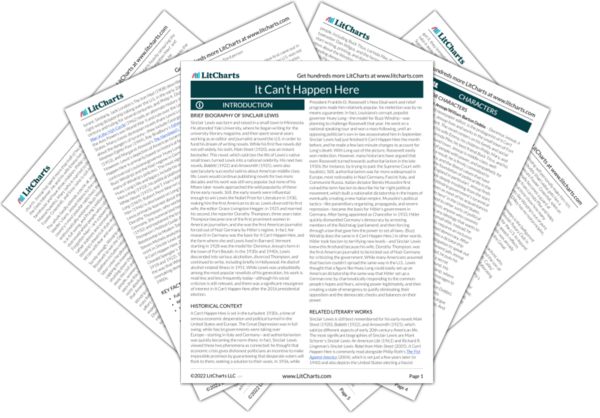Walt Trowbridge Quotes in It Can’t Happen Here
The conspicuous fault of the Jeffersonian Party, like the personal fault of Senator Trowbridge, was that it represented integrity and reason, in a year when the electorate hungered for frisky emotions, for the peppery sensations associated, usually, not with monetary systems and taxation rates but with baptism by immersion in the creek, young love under the elms, straight whisky, angelic orchestras heard soaring down from the full moon, fear of death when an automobile teeters above a canyon, thirst in a desert and quenching it with spring water—all the primitive sensations which they thought they found in the screaming of Buzz Windrip.

Unlock explanations and citation info for this and every other It Can’t Happen Here quote.
Plus so much more...
Get LitCharts A+[Doremus Jessup] had expected that traditionally Republican Vermont would give him too drearily easy a task in preaching Trowbridge. What he found was a dismaying preference for the theoretically Democratic Buzz Windrip. And that preference, Doremus perceived, wasn’t even a pathetic trust in Windrip’s promises of Utopian bliss for everyone in general. It was a trust in increased cash for the voter himself, and for his family, very much in particular.
But as for Doremus, he leaned back not vastly caring what nonsense the others might talk so long as it was permitted them to talk at all without finding that the waiters were M.M. spies; and content to know that, whatever happened, Trowbridge and the other authentic leaders would never go back to satisfaction in government of the profits, by the profits, for the profits. He thought comfortably of the fact that just yesterday (he had this from the chairman’s secretary), Walt Trowbridge had dismissed Wilson J. Shale, the ducal oil man, who had come, apparently with sincerity, to offer his fortune and his executive experience to Trowbridge and the cause.

Walt Trowbridge Quotes in It Can’t Happen Here
The conspicuous fault of the Jeffersonian Party, like the personal fault of Senator Trowbridge, was that it represented integrity and reason, in a year when the electorate hungered for frisky emotions, for the peppery sensations associated, usually, not with monetary systems and taxation rates but with baptism by immersion in the creek, young love under the elms, straight whisky, angelic orchestras heard soaring down from the full moon, fear of death when an automobile teeters above a canyon, thirst in a desert and quenching it with spring water—all the primitive sensations which they thought they found in the screaming of Buzz Windrip.

Unlock explanations and citation info for this and every other It Can’t Happen Here quote.
Plus so much more...
Get LitCharts A+[Doremus Jessup] had expected that traditionally Republican Vermont would give him too drearily easy a task in preaching Trowbridge. What he found was a dismaying preference for the theoretically Democratic Buzz Windrip. And that preference, Doremus perceived, wasn’t even a pathetic trust in Windrip’s promises of Utopian bliss for everyone in general. It was a trust in increased cash for the voter himself, and for his family, very much in particular.
But as for Doremus, he leaned back not vastly caring what nonsense the others might talk so long as it was permitted them to talk at all without finding that the waiters were M.M. spies; and content to know that, whatever happened, Trowbridge and the other authentic leaders would never go back to satisfaction in government of the profits, by the profits, for the profits. He thought comfortably of the fact that just yesterday (he had this from the chairman’s secretary), Walt Trowbridge had dismissed Wilson J. Shale, the ducal oil man, who had come, apparently with sincerity, to offer his fortune and his executive experience to Trowbridge and the cause.











